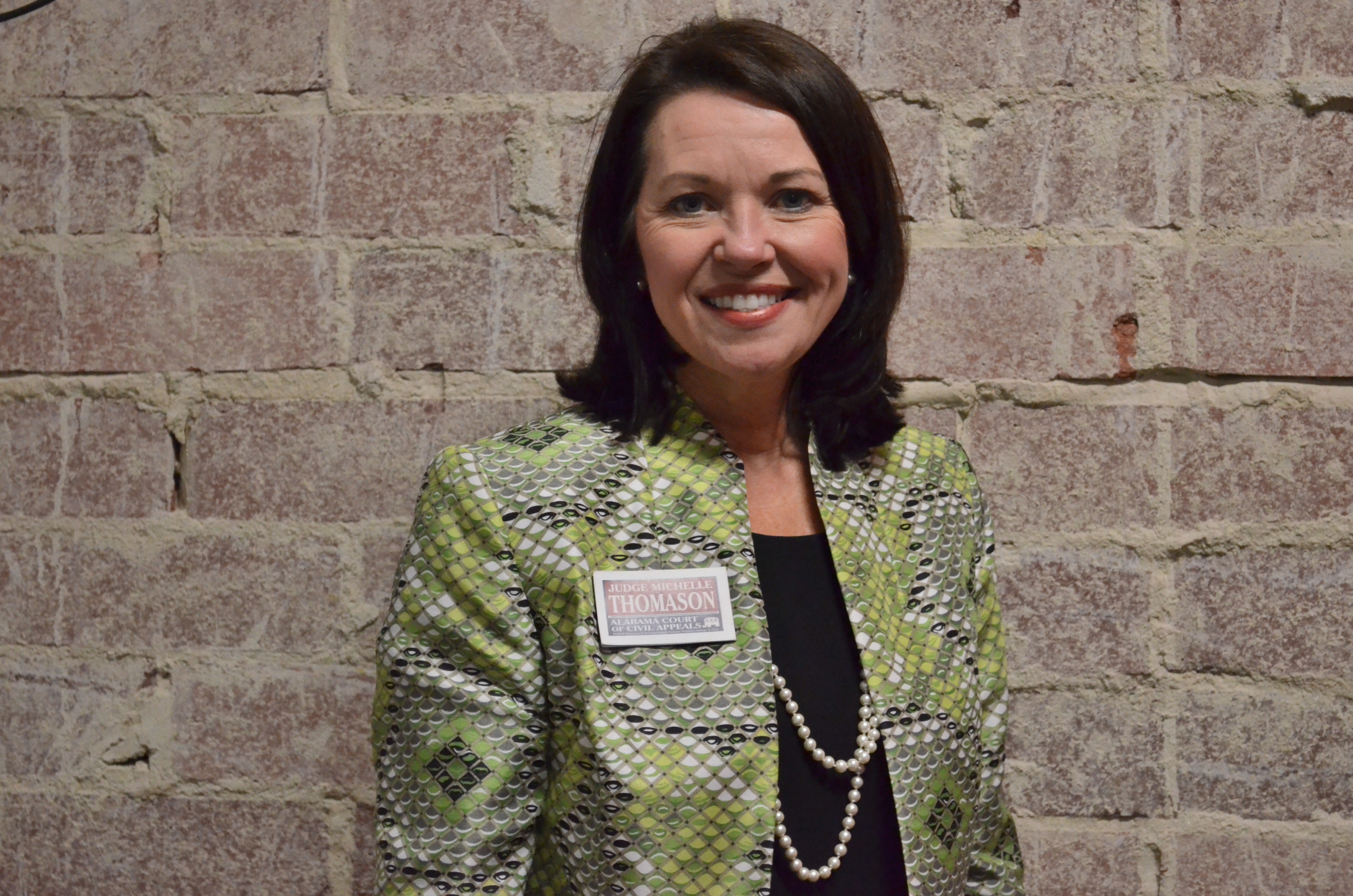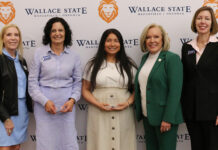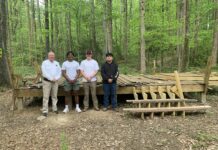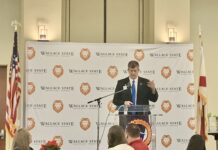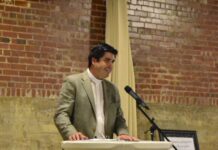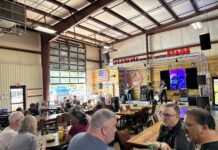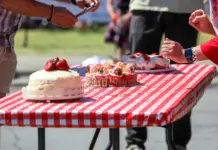Baldwin County Presiding District Judge Michelle Thomason visited veterans in Cullman this week to talk about her mission to bring a Veterans Court to Cullman County. (Nick Griffin for The Tribune)
CULLMAN – Cullman VFW Post 2214’s Thursday night speaker sat down with The Tribune on Friday to discuss in more detail some of her plans for helping veterans in Cullman County and hopefully the rest of the state.
Judge Michelle Thomason, on the bench for 12 years, is the presiding district judge in Baldwin County and is a specially appointed circuit judge due to most of her caseload involving family court cases.
Thomason founded the Baldwin County Veterans Court in 2014 and has been working with local judges to establish a Veterans Court in Cullman County as well.
Thomason is a candidate for the Alabama Court of Civil Appeals and will be on the ballot July 17 in the primary run-off election. She talked about how her experience in Baldwin County has prepared for the position and how she started crossing paths with veterans in the court system.
“I’m in the runoff for the Court of Civil Appeals; I’ve been a judge in Baldwin County for 12 years where I do preside over the Veterans Court. I’ve been a specially appointed circuit court judge from the first day because the majority of what I handle are family court cases and criminal dockets so the combination of those two is where I’ve seen many veterans in my court system,” Thomason said. “Seventy-five percent of my caseload is family court and as a practicing attorney for 11 years before I became a judge, the majority of my practice was family court and civil litigation, so I have handled for 24 years exactly the type of cases that the court of civil appeals handles. I’m the only candidate in the race that has- I’m the only candidate that’s ever had- any civil trial experience or had any family court experience.”
Thomason has been campaigning for her spot on the ballot as well as her spot on the bench.
“We’re second on the ballet, but I always say we’re first in experience,” Thomason joked. “There’s a little bit of an anomaly when folks around this state don’t know who to vote for in a race and instead of not voting at all, they tend to vote for the first name on the ballot alphabetically. It doesn’t take much analysis looking at the statewide results to see how that plays out, so you have to overcome that a little bit when you’re not the first name on the ballot, but we’re working hard to make sure it happens.”
It’s been just more than four years since Thomason founded Baldwin County’s Veterans Court, and she reflected on how the idea came about and what she did to get it started.
“About five or six years ago I began to see in my court, issues with veterans that were clearly related to their service to our country, and my hands were tied in terms of how I could deal with those issues as a judge. If I saw them in my criminal court I was limited to guilty or not guilty and jail time or probation. If I found them in my family court, there was very little I could do. So, I started doing some research to see if there was anything I could do proactively to help these veterans that were really struggling with issues like post traumatic stress, traumatic brain injuries, addiction to pain medication, those types of issues.”
Thomason continued, “I found that a judge in New York just a few years prior had started these Veterans Treatment Courts and so I contacted that court and began to do some training with them and learn about the process of what a Veterans Treatment Court is and how to start one. After going to the first national conference they put together, I came back and was able to get my court started in February of 2014. We’ve operated for almost four-and-a-half years and I have seen tremendous success in the program.”
The Veterans Court system allows judges to help veterans in need of treatment in ways that they can’t in more traditional court systems. Thomason said she has seen the system provide veterans with the help they need in a variety of ways.
“The way the court works is if a veteran is arrested, they’re immediately assigned to the Veterans Court docket. They have to voluntarily come into the program and what the program is, is a diversion program. They come in and plead guilty to their charge, but I don’t act on that guilty plea, I hold that plea and they voluntarily enter into a program where they commit to be with us for at least a year, sometimes because they need more treatment they stay in longer but it’s a minimum of a year. During that year they agree to complete any treatment protocol that we ask them to complete, and that treatment is designed by doctors who evaluate them and determine exactly what they need,” Thomason said.
“If it’s addiction issues we find rehab facilities that know how to treat addiction specifically for veterans, if it’s post traumatic stress we find group and individual counseling to give them the tools they need to deal with the issues related to their post-traumatic stress, therapy for military sexual trauma with women, whatever it is, we want them to get treatment. When they demonstrate a compliance with that treatment, then we graduate them at the conclusion and dismiss all their criminal charges so that they’re able to get back into society in a productive way and in the place of honor in our community that they deserve to be in.”
In an effort to get Veterans Courts set up all across the state, Thomason takes time to work with judges at conferences and works with some individually who reach out to her. Two local judges have been working with Thomason to try and bring the Veterans Court system to Cullman.
“I’m on a state task force and it is my goal to try to establish a Veterans Treatment Court in all the jurisdictions around the state so that it’s available to all veterans. I train judges on how to start the courts at conferences and things like that, but I also talk to judges individually. So, when judges are interested in starting a court they often reach out to me and ask me to come and guide them through the process or at least give them some advice. (Cullman County Circuit) Judge Greg Nicholas has reached out to me over the last few months with a sincere desire to start a Veterans Court in Cullman County. There is another judge here, (Cullman County District Judge) Rusty Turner, who is a veteran himself and I believe has agreed to be the presiding judge over that court if we get started. Judge Nicholas has already talked with the sheriff and the district attorney and gotten them on board with the program, but he wanted my help in trying to pull it all together and in helping to engage another component in this court, and one of the most important components, the mentor program.”
Thomason talked about her trip to the Cullman VFW Thursday night and how VFW members are an integral part in the system that she’d like to help bring to Cullman.
“What Judge Nicholas did was he set up a time when I could come and speak, which was last night, to the members of the VFW here in Cullman where I met Ken (Brown). I talked with those men and women about things they could do to help get this court started, and number one is just getting behind the program as a community and second is volunteering their time to be mentors in the program. There are lots of different treatment courts around the country- DUI courts, Mental Health Courts and Drug Courts- there are lots of diversion courts, but there’s not one other than Veterans Court that has a mentor program. Nationally they believe that the mentor component of this program is the reason these courts are so much more successful than those other programs. Veterans Courts nationally run between a 90 and 93 percent success rate which means that less than 10 percent of veterans that graduate are ever in trouble with the law again. Those are amazing statistics.”
Col. Ken Brown said that the crowd at the VFW Thursday night liked a lot about Thomason’s ideas and is excited to start seeing more people get behind the cause.
“She got a great reception at the VFW last night; we’ve been working with Judge Nicholas for the past six or eight months talking about this. We’ve had a couple of meetings with him and we’ll be meeting with him again here in the next couple of weeks with volunteers from the VFW that are willing to be trained in the mentor program,” Brown said. “They bring people in from out of state and give us the training that we need to get into this, and there are plenty of guys here that really understand the need, and it’s a band of brothers man, whatever we can do to help our brothers that’s what we want to do.”
Brown said he sees the need for a program like Thomason’s in Cullman and gave some reasons why a Veterans Court may be more necessary than ever before.
“The VFW does a lot in the community. We do the flags on the highways on holidays and we put flags on the veterans’ graves, we go see shut-in and sick veterans, we have Boy Scout programs and do a lot of veterans’ funerals. We do a lot of things to help our fellow veterans, but you know the younger veterans coming home have had two or three combat tours, sometimes four combat tours. Unlike those of us from Vietnam that went over there for a year and came home. So, these people have been traumatized probably far more than the average veteran in the past and the younger members of our post now realize that a lot more. They’re a lot more empathetic because they’ve been there, and they’ve done that, and they understand.” Brown said.
“So, that whole band of brothers thing where some of those young people that really need this help can get it down at the VFW or can get it through programs like Judge Thomason’s coming up with because people who have been through combat understand them and that’s what they want. They want somebody backing them up, they want somebody that really knows what they’ve been through, and the average civilian, you can talk to them all day long, but they have no idea what you’ve been through. When she was talking to the guys last night I was looking at them rather than looking at her and you could see that the wheels were turning and that she was getting a lot of positive head nods and we’ve got some people at the VFW right now that are suffering from PTSD pretty badly. So, it’s a big problem, we all understand it, we all want to help, and we probably want to help more than the average civilian does because we understand it a lot better,” said Brown.
Thomason’s long-term goal when it comes to Veterans Courts is to have a court accessible to everyone all across the state, and she believes that Cullman is a great place to continue that process, not only due to its high veteran population, but also as an example for other counties to learn from.
“I think this would be a wonderful place to make it happen because one of the biggest critiques we get about trying to set up all around the state, is ‘Our county is too small, we don’t have enough resources, we don’t have enough veterans to support a court,’ but Cullman is situated in an area where there is a huge number of veterans. It’s my understanding that with a population of 88,000 there are 7,000 veterans here; that’s huge, that’s almost 10 percent,” Thomason said. “So, it’s an ideal place for a Veterans Court, but also, you’re surrounded by smaller counties that don’t have the resources to establish their own court, so to get this one established could really be a cornerstone court for the rest of the state in learning how to establish a jurisdictional court. We’ll need some help from the legislature; there was a bill in the hopper last time that allowed counties to transfer their cases to other courts for this purpose. It did not get passed, it may need a little bit of tweaking, but it has to get passed, to allow us to transfer those cases or combine those jurisdictions so that we can get them all over the state.”
Copyright 2018 Humble Roots, LLC. All Rights Reserved.

